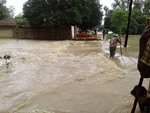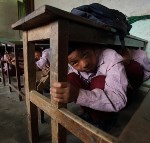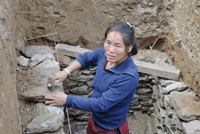Nepal
Published on Mon, 2020-11-16 16:44
Nepal should recover from the human and economic devastation caused by COVID-19 by accelerating efforts to achieve SDGs. Nepal needs clamor for policy attention and scarce resources, there is great temptation during crisis to react only for the immediate term. That would be a big mistake: as every recent crisis has revealed, Nepal is extremely vulnerable to underlying threats that can quickly become existential for large sections of the population. |
Published on Wed, 2018-11-21 10:29
Food is the axis of the civil society report on the SDGs in Nepal, where “transnational corporations are grabbing land, monopolizing seeds and food markets, and marginalizing small holder farmers more”. As visible evidence, “now in Nepal packed foods are common not only in the urban townships but also in remote and hard to reach areas, replacing indigenous food consumption patterns. Farmers rely heavily on seed markets rather than preserving their own seeds, which was common practices in Nepal even a few years back.” Food quality is degrading as farmers are using chemical pesticides and fertilizers. This creates health problems, and even when food availability has improved, the supply is inadequate to meet the surging food demand. Cereal import dependency has been rising, while Nepal's capacity to export food has been falling. This can also be linked with the huge out-migration among youth for work in foreign lands in the absence of opportunities in the country. |
|
In this world, 800 million people go hungry every day and 2 billion suffer from some form of malnutrition. In this same world, according to the FAO, as of 2011 more than a third of the adult population is obese and a third of all food produced is lost or wasted. Though it is said that hunger doesn’t discriminate, the poorest nations are suffering the most.
This year’s Global Health Index (GHI) has put a lot of priority on how inequality of all forms determines food insecurity in a country. It is very important to discuss this correlation because everyone needs to be aware and empathetic towards what continues to happen. It is the people or group with the least social, economic or political power - those who are discriminated against or disadvantaged-- who are most affected by food and agricultural policies, but have little say in policy debates dominated by powerful governments and multilateral corporations. With continuing globalization, land grabbing is rampant. LDC countries often face pressure to shape their agricultural policies to suit the preferences of large corporations looking to control the world’s food supply.
|
Published on Mon, 2017-09-04 07:52
Nepal has faced one socioeconomic shock after another in a relatively short period of time, be it the ten- year civil war or the devastating earthquake or the unstable government, which has changed 25 times since the restoration of democracy in 1990. At the end of 2015, the government introduced the Public Private Partnership (PPP) policy followed by trainings and programmes emphasizing the need for private investment to finance public services, especially for the SDGs. The ultimate need of private entities to maximize profits in order to stay in business is fundamentally incompatible with protecting the environment and ensuring universal access to quality public services. This is evident in the failure of Kathmandu Upatyaka Khanepani Ltd. (KUKL), the first PPP scheme in 2008, to deliver its promise to improve the water delivery efficiency around Kathmandu Valley. High water tariffs, undersupply of water and high deficits also shows the inefficiency of the board, chaired by the representative from a private sector, along with KUKL. |
Published on Sat, 2015-04-25 00:00
The death toll has now passed 3,300, and there is no telling how much farther it will climb. Search and rescue operations in Nepal entered their third day Monday, as the government and international aid agencies scramble to cope with the aftermath of a 7.8-magnitude earthquake that struck this South Asian nation on Apr. 25. Severe aftershocks have this land-locked country of 27.8 million people on edge, with scores missing and countless others feared dead, buried under the rubble. |
Published on Fri, 2014-12-26 08:56
Even after four UN Conferences and four specific Programmes of Action for addressing special development challenges of LDCs, the number of LDCs has doubled from 24 in 1971 to 48 now. Only four countries have graduated out of the LDC category so far. Hence, it is critical that LDCs and development partners act with greater political will to materialise their commitments defending LDCs’ developmental interests and priorities. Above all, it’s the accountability to LDC peoples that is key and of utmost priority. There are many issues that the people of LDCs and the governments face, that stand as roadblocks to graduation. The dominant development paradigm and the current international aid architecture, which overwhelmingly prioritizes profits and markets have failed in addressing the development challenges faced by LDCs. |
Published on Thu, 2013-02-14 22:37
Evidence in Nepal suggests that the root causes of the political conflict include not only the severity of poverty and inequality but also the sense of entrenchment - that opportunities are limited or non-existent for the poor to climb out of poverty. Therefore, addressing constraints on the inclusiveness of development is critical in order to make a real difference in the lives of Nepalis and reduce the risks of instability. |
|
Evidence in Nepal suggests that the root causes of the political conflict include not only the severity of poverty and inequality but also the sense of entrenchment - that opportunities are limited or non-existent for the poor to climb out of poverty. Therefore, addressing constraints on the inclusiveness of development is critical in order to make a real difference in the lives of Nepalis and reduce the risks of instability. Systemic changes in the development approach must be undertaken to adequately address the needs and priorities of the excluded and marginalized sections of the society. A stable political structure upon which well-informed policies, institutions and mechanisms can function over time is a major determinant for people’s empowerment and strengthening Nepal’s peace and fragile democracy.
|
SUSCRIBE TO OUR NEWSLETTER








